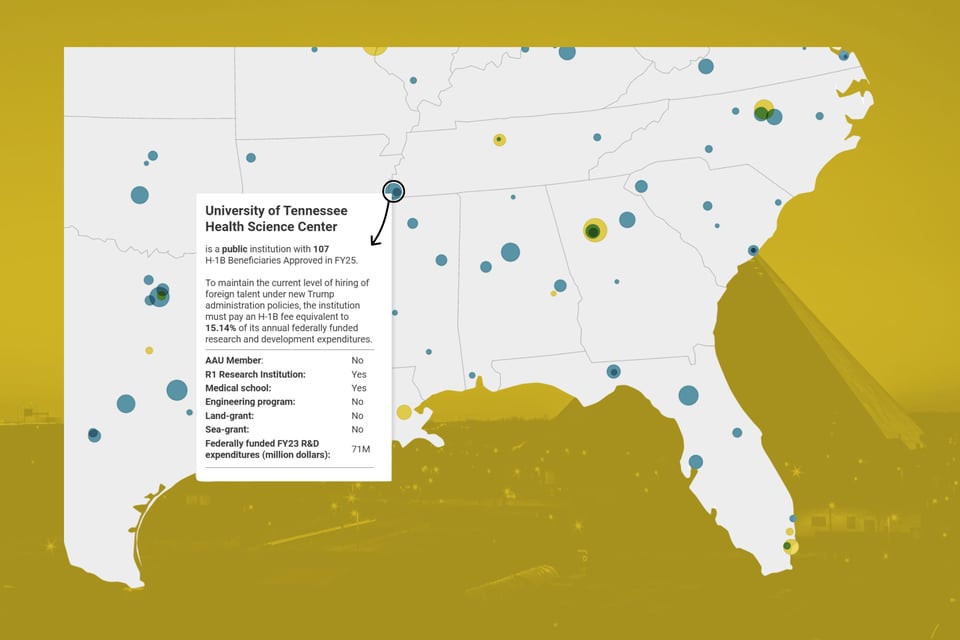ICYMI: The H-1B Visa Holders Joining America's Top Research Institutions
Check out our exclusive analysis on how your nearest university might be affected by Trump's $100,000 H-1B fee and further Republican restrictions
Dear Reader,
This week, we released a new analysis that shows for the first time just how much America’s top research institutions have grown to depend on the specialized knowledge of H-1B skilled workers — and how this delicate balance might be disrupted by U.S. President Donald Trump’s crackdown on legal immigration.
We identified more than 13,000 H-1B workers who have joined over 200 four-year or postgraduate-only land-grant, sea-grant, and R1: Very High Spending and Doctorate Production institutions so far this fiscal year.

In the last fiscal year, 71% of approved H-1B beneficiaries were from India, followed by 11.7% from China. As the only Asian American-run news outlet covering science, climate, and the environment, we’re here to equip you with the tools to understand what’s at stake for our best and brightest.
You are invited to a virtual walkthrough and discussion of our maps on October 8th at 1 pm ET. Bring your questions, suggestions, and a friend!
Yours sincerely,
Alex Ip
Publisher and Editor
THINGS YOU SHOULD READ
✨ NEWS BEHIND THE NEWS
💸 Thank you to our new members Ananya Chakravarti, returning member Stephen Nash, and new donor Bernadette Callahan! As a reader-funded news outlet, our goal is to have 60% of our revenue come from you by the end of the year. Support us with a small, monthly donation here.
⚛️ This year's Science Journalism Forum (SJF) runs from October 27 to 30 in the United Arab Emirates (UAE) —with a hybrid option to join from anywhere in the world. The theme is "Science Journalism at a Crossroads: Rethinking Trust, Funding, and Innovation." You are eligible for 50% off all SJF ticket types with the discount code Xylom50. Join us!
📱 ICYMI: We’re piloting a WhatsApp channel, which would help reach users who stay off social media, and curb misinformation at the source (share it with your immigrant parents, aunties, or uncles!)
Like this newsletter? Share it with a friend and subscribe below!
🍑 A SOUTHERN FLAIR
WESTERN NORTH CAROLINA — Trump raised $8 million for Hurricane Helene survivors. Where did it all go? (Katie Myers, Grist and Blue Ridge Public Radio)
But the choices aren’t mysterious to experts who’ve studied the ongoing relationship between the far right and evangelical philanthropy. Both favor smaller government and individual giving over tax-based public relief, said Alison Greene, a religious historian at Emory University.
CADDO COUNTY, Okla. — Tokelahoma’s Cautionary Tale: How Weed Legalization Went Wrong in a Deep Red State (Paul Demko, POLITICO)
“If you have survived this long, you’ve got thick, thick skin,” said Donald Gies, an Oklahoma City attorney with dozens of cannabis clients. “You have determination. You have grit. Bless your heart. I want to think that it’s going to get better. I just don’t know. I just don’t know.”
ATLANTA — Climate crisis musical comes to Atlanta. ‘Dear Everything’ is for everyone (Kala Hunter, Columbus Ledger-Enquirer)
“How can we tell a story that shows young people who have a sense of the future in their bodies and (at the same time) older people are just trying to survive?” V posed to the Ledger-Enquirer. “It would look like where young voices are speaking what they feel.”
🗺️ WHAT ELSE WE'RE READING
Syria’s quest to build its own Silicon Valley (Emily Wither, Rest of World)
“It was our dream, but it was surprising,” Hourani said of watching his country change overnight. “The first thing that happened when the regime fell is that the mobile phones started working again!” It was, maybe, a good omen.
Could Weakening Environmental Law Actually Strengthen Climate Action? (Yessenia Funes, Atmos)
“Under NEPA, lawsuits don’t really determine whether a project is good or not. They determine whether the review is good or not.”
— Aidan Mackenzie, infrastructure fellow, Institute for ProgressHow an old newspaper in Hiroshima is keeping the memory of survivors alive (Reuters Institute for the Study of Journalism)
The [Chugoku Shimbun] newspaper is now working on this 80-year-old story with a true sense of urgency. “Most atomic bomb survivors are in their 80s, and there will soon come a time none of them will be around,” said senior staff writer Michiko Tanaka. “Many don’t have clear memories already.”
The Ig Nobels are science’s most lighthearted event. This year is ‘not typical’ (Hannah Richter, Science)
In all, nearly half of this year’s Ig Nobel recipients declined to attend. Wars, visa restrictions, and the research and border policies of U.S. President Donald Trump’s administration have all dampened the fun.
SOME OF OUR RECENT STORIES
🍎 When “White Manure” Disappears From India's Himachal Region, So Do The Apple Trees
NEW: As climate change reduces snowfall across Northern India, apple farmers in Himachal Pradesh are doing the unthinkable to save their crops: driving miles up the Himalayas to fill buckets of "white manure".
👚 Meet the Women Stitching a Resilient Future on Dal Lake
Climate change has a profound impact on the ecology surrounding Dal Lake in Kashmir, threatening the lake’s water resources, biodiversity, and the livelihoods of those who rely on it. In response, women are taking up embroidery to gain more control over their income.
🛢️ No One Wants To Be the Fall Guy for Oil Spills off India’s Coast
Since 2024, six large oil spills have polluted India's western coast, affecting millions in Mumbai and beyond; yet, no one, including the government, wants to take responsibility for the cleanup.
Add a comment: